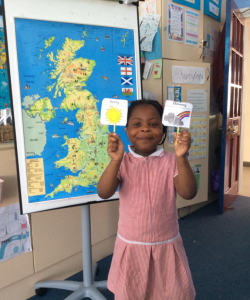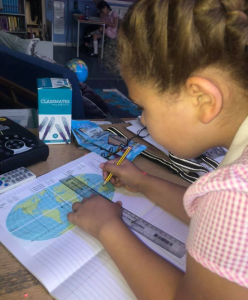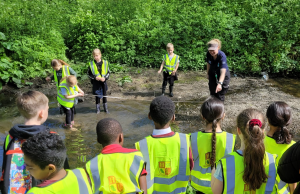 Geography teaches an understanding of places and environments. Through their work in geography children learn about their area and compare their life in this locality to other regions in the United Kingdom and in the rest of the world. They learn how to draw and interpret maps and they develop the skills of research, investigation, analysis and problem solving. Through their growing knowledge and understanding of human geography children gain an appreciation of life in other cultures. Geography teaching also motivates children to find out about the physical world and enables them to recognise the importance of sustainable development for the future of mankind.
Geography teaches an understanding of places and environments. Through their work in geography children learn about their area and compare their life in this locality to other regions in the United Kingdom and in the rest of the world. They learn how to draw and interpret maps and they develop the skills of research, investigation, analysis and problem solving. Through their growing knowledge and understanding of human geography children gain an appreciation of life in other cultures. Geography teaching also motivates children to find out about the physical world and enables them to recognise the importance of sustainable development for the future of mankind.
At Harrow Lodge Primary School we believe Geography is an important part of the curriculum where pupils can become engaged and develop key skills. Geography is an exciting, relevant subject which can be seen in action in the daily lives of our pupils. There are many cross curricular links to ensure pupils are able to see the subject in context to themselves and the lives of the community around them and wider world, developing their ideas of global citizenship.
The aims for geography in our school are:
- To stimulate children’s interest in their surroundings and develop a knowledge and understanding of the physical and human processes which shape places.
- To increase children’s knowledge of other cultures and, in so doing, teach a respect and understanding of what it means to be a positive citizen in a multi-cultural country.
- To provide learning opportunities that enthuse, engage, and motivate children to learn and foster a sense of curiosity and wonder at the beauty of the world around them.
- To encourage in children a commitment to sustainable development and an appreciation of what ‘global citizenship’ means.
- To make sense of their own surroundings through learning about their own locality and the interaction between people and the environment.
- To develop the geographical skills, including how to use, draw and interpret maps of different scales, and the vocabulary necessary to carry out effective geographical enquiry.
- To be able to apply map reading skills to globes and atlas maps and identify geographical features.
- To formulate appropriate questions, develop research skills and evaluate material to inform opinions.
- To enable children to work geographically in a range of appropriate contexts, using a variety of materials and equipment including other people’s experiences and knowledge.


